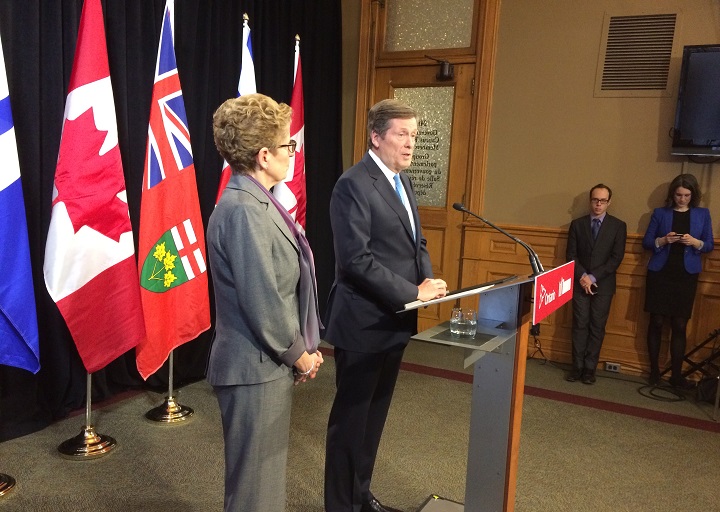Transit relief in Toronto became a small step closer to reality on Thursday as Premier Kathleen Wynne signed a memorandum of understanding (MOU) on Mayor John Tory‘s SmartTrack plan and announced the province would support several other major transit projects.

At a press conference at the GO Transit Willowbrook maintenance facility Thursday morning, Wynne said the government would partially fund the Downtown Relief Line, the Yonge North subway extension and the Waterfront light rail transit service.
She said the funding was included in her Liberal government’s spring budget, tabled just months before a provincial election. The fiscal blueprint did not specify which infrastructure projects the money would be spent on.
The investment is $9 billion, though Wynne could not say how much was going to each project.
The MOU between the city and the province on SmartTrack would see Toronto contribute up to $1.46 billion toward half a dozen new transit stations as part of the larger regional express rail network project overseen by the provincial transit authority Metrolinx.

Get daily National news
SmartTrack has already passed a few key votes at Toronto city council and is expected to be completed by 2025. The project would see increased service on the GO line, with trains running every 5.5 to 10 minutes during peak periods.
Fares within the city will match that of the TTC, at $3 for PRESTO users.
Wynne suggested transit might not flourish as much if a different party forms the government in June. She warned that a Progressive Conservative government under her opponent Doug Ford would review “all projects.”
“We can’t allow Toronto to be dragged back into endless debates, the days of throwing out plans and starting from scratch,” she said.
“You could fill the Rogers Centre with the transit plans that this city has drawn up and thrown away.”
SmartTrack, which uses existing GO Transit rail lines, was first proposed by Tory during the 2014 municipal election.
The federal governmentstruck an agreement with the province in March to provide $8.3 billion for Ontario transit infrastructure over 10 years, with the province contributing an additional $7.3 billion.
— With files from the Canadian Press












Comments
Want to discuss? Please read our Commenting Policy first.